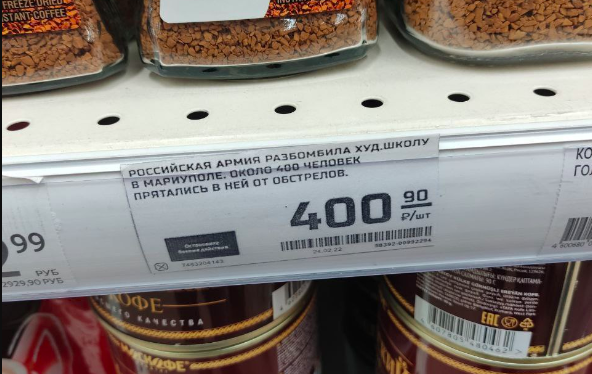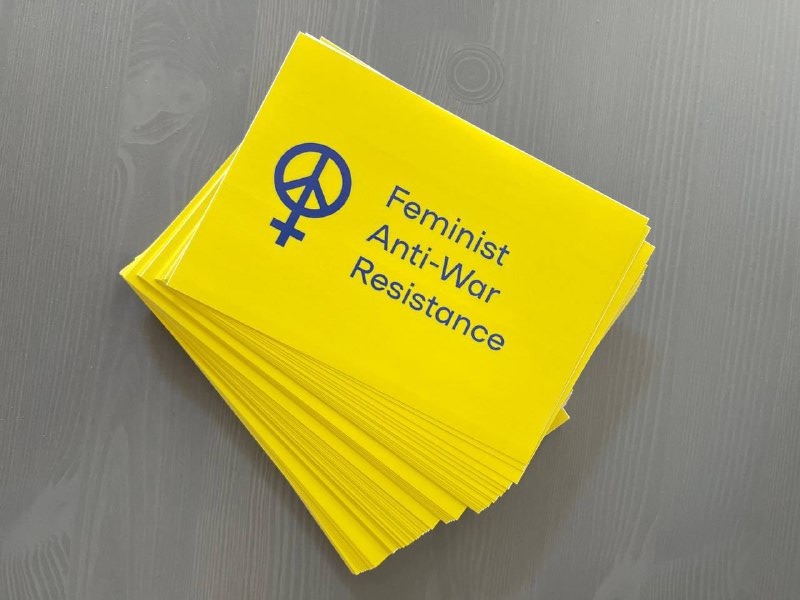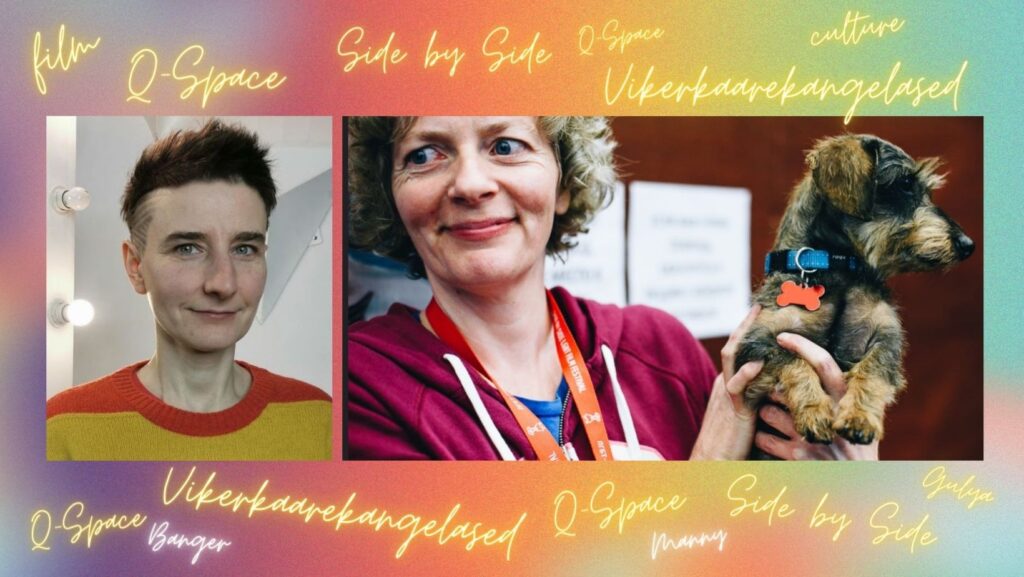Anti-war activist Lölja Nordic: Russian people who stand against the war risk everything they have
In February, a few days after the start of the war, Russian feminists joined forces and formed an anti-war resistance group, which now appears to be the most organized anti-war movement in Russia. Aet Kuusik, editor of Feministeerium, talked to one of its members, eco-feminist activist and artist Lölja Nordic about the work of feminists in Russia, arrests and protests, and how the group does its work. The interview can also be listened to as a podcast, it has been translated, adapted and edited for this article.
Please introduce yourself to the readers of Feministeerium. Who are you and what do you do?
I am an artist and activist and a member of several feminist groups in Russia. One is the Eight Initiative Group in St. Petersburg, and the other is the Feminist Anti-War Resistance, a movement that includes many feminist activists who all came together to fight the war and figure out together how we can stop the war together.

Anti-war activist Lölja Nordic
The movement was founded on the second day of the war, and now [the interview took place on May 27] we have many members around the world, we do not only operate in Russia. We are trying to involve other feminist organizations to help spread the word about the war and to share our common desire to oppose and end it.
The feminist anti-war movement works both online and offline. How is your work organized?
I was forced to leave my hometown of Russia because I was constantly harassed by the police and secret police last year, I was threatened many times. This was done not only by the secret police, but also by neo-Nazis and other groups on the Internet who are very misogynistic and xenophobic. In Russia, they are operating side by side with secret police, threatening activists like me and making our lives as difficult as possible. Now, recently, when the war started and we began to engage in anti-war activism, my home was raided and I was told I was a suspect in telephone terrorism – a very harsh charge designed to obstruct and intimidate us. This is a serious matter and we risk five years’ imprisonment. I was arrested for several days and was advised by lawyers to leave the country temporarily. That’s how I came to Tallinn. Here I continued to work online – I coordinate, I do cyber activism, I disseminate information. At the same time, I started helping Ukrainian war refugees both online and offline, because Estonia is one of the main places where the Ukrainian people who have been abducted by the Russian army and taken to Russia, reach. They are trying to escape from there, and Estonia is one of the main transit points for moving on. I and other Russian-speaking activists communicate with them, meet them, look for transport options, places to sleep and so on. Members of the group “Friends of Mariupol” based in Narva and Tallinn help refugees passing through Estonia. And I do the work, too.
How are doing the activists who have stayed in Russia?
It is very difficult. Some activists, like me, have had to leave Russia because they have been prosecuted for activism and have not had the opportunity to hide somewhere in Russia, to go to another city for example. But most activists are still in Russia and cannot leave for one reason or another. Or staying in Russia is their fundamental decision. We who have had to leave feel that we have been driven out of our homes, we did not leave voluntarily. I know many people, such as Marina Aljohhina from Pussy Riot, who said that she would stay in Russia and go to prison – she would not let get herself evicted from her own home. She is not in Russia at the moment because he fled to go on tour, but will return after the tour. She is a real badass feminist who escaped while in custody [Marina Aljohhina escaped disguised as a food courier at a time when she had been placed under house arrest by the authorities. Ed.]. The only option for many people is to do anonymous activism and partisan activism. Many work in secret, they do not show their faces, and risk this war with everything they have. I respect that very enormously.

Anti-war group flyers. Photo: Feminist Anti-War Resistance Group
Is there still street protests in Russia? We know that thousands of people were arrested simply for going to protest. How is it now?
During the first two weeks of the war, protests were made every day throughout Russia. 50,000 people were arrested, which was very devastating and frightening. You will be arrested once, a second time, a third time you will be prosecuted and the risk of imprisonment is very high. Fewer people started going to the protests. Nowadays, individuals are more likely doing individual pickets here and there. It is crucial to understand that street protests do not currently work in the Russian context, because they pose a greater risk than their benefits. There is no democracy in Russia, we had an authoritarian regime that is now moving more and more towards a military dictatorship. Under these conditions, you can bring thousands of people to the streets, but how does this help if the system is undemocratic? Police are shooting down protesters and arresting them all. So people have started looking for more sustainable ways of resisting, doing anonymous protests. We do not need activists in prisons. There is no need activists who are prosecuted. We need people who are active and do the job. And now the only way to do it anonymously and as a partisan.
Could you explain why you consider your work feminist?

A piece of partisan activism from Russia: anti-war and peace messages are written on the banknotes and put into circulation. Photo: Feminist Anti-War Resistance Group
This is a very good question that I will be happy to answer. Russia’s policy is not exactly feminist friendly. The word feminism already irritates many, asking why you have to pull off feminist all the time. But it is quite clear to us – feminism has always been a movement against violence. War is the most extreme form of violence you can imagine. Feminists are against all forms of violence: domestic violence, police violence or state violence. We are noticing the trends that Russia has been moving towards for 20 years. We see a link between domestic violence – a huge problem in Russia – and war. We want to send a message to our supporters in Europe and elsewhere that the war did not start in a second.

The anti-war resistance group disseminates war-related information and statistics, placing fact sheets in people’s mailboxes, but also exchanging price tags in stores for messages with military statistics messages. The message on the coffee price tag says that the Russian army bombed a school in Mariupol and that 400 people had to hide. At least one member of the group has been arrested for the price tag action and is on trial for inciting political hostility and disseminating false information, and is facing up to ten years in prison. Photo: Feminist Anti-War Restistance Group
When I talk to my European friends about the violence and torture in Butcha and Kramatorsk, the murders and killings committed by Russian soldiers, they are shocked. They don’t understand how people do this to each other. We, insiders, understand this, because the Putin regime and the Russian state have normalized violence against women, against queers, against migrants, against foreigners, against anyone who can be considered the other. Intra-military violence is rampant in Russia, and even in peacetime, young men do not want to go to the army for a few years because it is dangerous. Prison violence is normalized – extreme brutality and violent torture are commonplace. All this has been normalized for a long time and now the puzzle got together. I and other activists understand that all this has been a preparation through which the violence in the war in Ukraine can now be shown to be normal. If it is normal for a man to beat his wife to death and know for sure that he will not go to prison for it because the country has normalized violence, then that will stop him from killing his “enemy” in another country. Of course nothing. This attitude has escalated over the years. We are trying to make these connections visible, and that is why we are a feminist anti-war movement.
What is the most important thing to do now to resist the war?
It depends on where are you located. In Russia, it is extremely important to share information because all independent media are closed. All state media are propagandistic. Many people, especially the elderly, simply do not have access to information. Nothing is safe in Russia, but in your family circle, around your acquaintances, you can spread information about war and war crimes and talk about these things. It is also important to help all the thousands and thousands of Ukrainians who have been deported to Russia. They are afraid, they are in completely unknown places and confused. They need local people to help them to leave, to Estonia, Lithuania, Ukraine back to Ukraine through Europe, if they want to. Many want to go back to their relatives and to western Ukraine, where it is somewhat safer. The Russian state wants them to stay in Russia to take advantage of them and show that you see, we saved these thousands of people from the whirlwind of war and they are now living peacefully in Russia. The Russian people need to help them leave.
The most important thing for Europe is to lift the embargo on fossil fuels – not to buy gas, oil and coal from Russia. Putin is not interested in other sanctions. It has enough resources to wage war, it will not stop it if Europe does not stop funding the war. The sums of money that Europe gives Putin to buy mineral resources are colossal. So we need to do the work of influencing politicians so that it does not continue. Everyone in Europe should unite to demand this, otherwise the war will not end.










